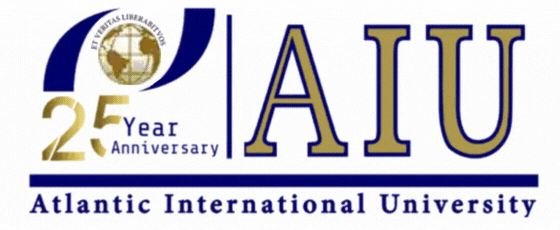- RESEARCHDistance Learning at AIU is enhanced by vast academic resources and innovative technologies build into the Virtual Campus: Hundreds of self-paced courses with video lectures and step by step lessons, thousands of optional assignments, 140,000 e-books, the Social Media & Networking platform allowing collaboration/chat/communications between students, and MYAIU develop students holistically in 11 areas beyond just academics.
- PROGRAMS OFFERED
- Areas of Study
- Courses and Curriculum
- Open Courses
- Register for a Program
- Associate Program
- Associate in Addiction Counseling
- Associate in Agriculture Food And Resources
- Associate in Anti Terrorism Security
- Associate in Behavior Analysis In Special Education
- Associate in Bioethics
- Associate in Climatology
- Associate in Cultural Theological Communication
- Associate in Culinary Arts
- Associate in Ecotechnology
- View all Associates Programs
- Bachelor Program
- Bachelors in Community Development
- Bachelors in Environmental Science
- Bachelor in Education (B.Ed, BS)
- Bachelors in Economics
- Bachelors in Entrepreneurship
- Bachelors in Financial Administration
- Bachelors in Human Resource Management
- Bachelors in Linguistics
- Bachelors in Nutritional Science
- Bachelors in Occupational Health and Safety
- Bachelors in Psychology
- View all Bachelor Programs
- Doctorate Program
- Doctor | of Biology (PhD)
- Doctorate in Business Administration (DBA, PhD)
- Doctor of Economics (PhD)
- Doctor of Electrical Engineering (D.Sc, PhD)
- Doctor of Finance (PhD)
- Doctorate in International Relations
- Doctorate in Information Technology (D.Sc)
- Doctor of Legal Studies (PhD)
- Doctor of Project Management (PhD)
- Doctor of Sociology (PhD, D.Sc)
- Doctorate in Sustainable Natural Resources Management
- View all Doctorate Programs
- Master Program
- Postdoctoral Program
- Postdoctoral in Animal Science
- Postdoctoral in Anti Terrorism Security
- Postdoctoral in Behavior Analysis In Special Education
- Postdoctoral in Bioethics
- Postdoctoral in Blockchain Technology and Digital Currency
- Postdoctoral in Business Management
- Postdoctoral in Cloud Computing
- Postdoctoral in Computer Engineering
- View all Postdoctoral Programs
AIU offers a wide range of majors in areas including the Arts, Business, Science, Technology, Social, and Human studies. More than 120 degrees and programs are available for adult learners at the associate’s, bachelor’s, master’s, doctoral and postdoctoral level. - VIRTUAL CAMPUS
Distance Learning at AIU is enhanced by vast academic resources and innovative technologies build into the Virtual Campus: Hundreds of self-paced courses with video lectures and step by step lessons, thousands of optional assignments, 140,000 e-books, the Social Media & Networking platform allowing collaboration/chat/communications between students, and MYAIU develop students holistically in 11 areas beyond just academics.
- ALUMNI
The world is YOUR campus!”, that is the message of AIU’s month magazine Campus Mundi. Hear the voices and see the faces that make up AIU. Campus Mundi brings the world of AIU to you every months with inspirational stories, news and achievements by AIU members from around the world (students and staff are located in over 200 countries).
Navigating the Boundaries of Management

Why do you think there’s such a strong emphasis on data-driven decision-making in modern management practices?
In what ways can storytelling and metaphorical language be used to bridge the gap between data analysis and the acceptance of new ideas within an organization?
Why do you think some innovative products struggle to find market acceptance despite their technological advancements?
Please review the course material provided below. Then, create an essay that addresses the given topic. What are your thoughts and perspectives on the matter? Explain why this topic is important. Also, discuss possible applications of this topic to improve your professional life.
(Login to your student section to access the AIU Additional Resources Library.)
Navigating the Boundaries of Management
In an era where the big data revolution has pronounced the view that management is a science, necessitating data-driven decisions, a stark transformation in business strategy is observable. According to an EY survey, it reveals that 81% of executives prioritize data in decision-making underscores a seismic shift towards dismissing intuition-based strategies. This inclination is deeply rooted in the backgrounds of countless managers and MBA holders, echoing the principles of “scientific management” championed by Frederick Winslow Taylor.
With more than 150,000 MBA graduates entering the workforce annually in the U.S. alone, the movement to scientize management appears to be gaining ground, spurred on by critical evaluations of business education by the Ford and Carnegie Foundations back in 1959. These critiques led to a concerted effort to imbue business education with the rigor characteristic of the hard sciences.
Yet, this raises pivotal questions: Can management truly be distilled into a science, and does rigorous analysis equate solely to data scrutiny?

Source: blog.tuf
Redefining Science and Innovation in Business
At the heart of modern science lies the legacy of Aristotle, who introduced the world to cause-and-effect analysis in pursuit of incontrovertible truths. This foundation gave rise to the Scientific Method, a cornerstone of Enlightenment thinking that propelled the Industrial Revolution and global advancement.
However, Aristotle himself cautioned against the overreach of science, highlighting the distinction between understanding the immutable and recognizing the capacity for human agency to forge new outcomes. This distinction is crucial in the realms of business strategy and innovation, where reliance on historical analysis alone is insufficient to chart future courses. The transformative visions of iconic figures like Jobs and Wozniak serve as a testament to the limitations of a purely scientific approach to management.
Challenging the Status Quo
Distinguishing between what can and cannot be changed is essential for executives navigating the complexities of business decision-making. For instance, while certain physical constraints in a bottling line process are unchangeable, the sequence of operational steps may not be, as demonstrated by LiquiForm’s innovative approach. This necessitates a rigorous examination of what executives deem unchangeable, urging a shift towards a mindset where design and imagination are given precedence, supported rather than dictated by analytics. The experience of Lego’s CEO, Jørgen Vig Knudstorp, illustrates the peril of equating data with immutable logic, highlighting the transformative potential of challenging prevailing assumptions.
Breaking free from established paradigms requires an exploration of new possibilities, often facing the entrenched status quo. This was evident in the consulting advice provided to nonprofit organizations trapped in a “starvation cycle.” By stepping beyond the accepted framework and engaging with donor perspectives, innovative process-oriented solutions emerged, underscoring the power of reimagining existing narratives.
The Art of Business Storytelling
The essence of science is to explain the world as it is, whereas the art of storytelling imagines the world as it could be. This narrative construction leverages Aristotle’s rhetorical principles—ethos, logos, and pathos—to craft compelling visions that can inspire change. A notable example of this is the merger of two major insurance companies, where leadership eschewed traditional integration methods in favor of a unifying metaphor, successfully engaging employees and boosting performance.
Bridging the Gap Between Ideas and Acceptance
The importance of metaphors in shaping understanding and facilitating the acceptance of new ideas cannot be overstated. These cognitive tools not only foster innovation by linking disparate concepts but also aid in the articulation and reception of novel products. The struggle of products like the Segway to find a market foothold exemplifies the challenges faced when a relatable metaphor is absent.
In deciding the future direction of a business, crafting multiple compelling narratives, each anchored by a strong metaphor, and subjecting them to a rigorous testing process can elucidate the most viable path forward. This approach contrasts starkly with the “cannot world” of predetermined outcomes, advocating for a proactive creation of data through prototyping in the “can world” of possibilities.
Finding the Right Blend of Science and Creativity
In conclusion, while the scientific analysis of data has undoubtedly made the world a better place, its application in management must be judicious. In scenarios governed by immutable laws, scientific methods and analytics offer a competitive advantage. However, in the realm of potential change, an overreliance on analytics can blind us to opportunities for innovation, leaving the door open for competitors to redefine the market.
Recognizing when to apply the principles of science and when to venture beyond them into the domain of imagination, experimentation, and narrative construction is the hallmark of truly effective management.
AIU offers a comprehensive array of recorded live classes spanning various subjects. Should a specific topic capture your attention, you have the opportunity to delve into related live sessions. Furthermore, our expansive online library houses a wealth of knowledge, comprising thousands of e-books, thereby serving as a valuable supplementary resource.
Personal Financial Management by Muhammad S
Personal Financial Management Part 2
Stress Management: A Resilient Approach by Umar H
Project Management for Rural and Sustainable Development by Niavo Landihajaina R
Human Recourse Management, Healthcare focus by Dr Omer Farooq Khan
Mastering the art of self leadership by Umar Hassan
Project Management with Trello by Jay Vijayasimha
Applications of Management Science by Kenneth D. Lawrence and Dinesh R. Pai
References
Why Management Needs Philosophers (hbr.org)
Is Management Still a Science? (hbr.org)
TUF Blog | Blog Of TUF | Management Sciences | What is a management science degree?
Reminder to our Dear Students,
Please ensure you are logged in as a student on the AIU platform and logged into the AIU Online
Library before accessing course links. This step is crucial for uninterrupted access to your learning
resources.
AIU Success Stories







Contact Us Today!
Begin Your Journey!
AIU’s Summer of Innovation and Growth gives you the ability to earn up to $5000 in tuition credit by completing free lessons and courses.
Whether you’re looking to acquire new skills, advance your career, or simply explore new interests, AIU is your gateway to a world of opportunities. With free access to 3400 lessons and hundreds of courses the ability to earn credits and earn certificates there’s no better time to start learning.
Join us today as a Guest Student and take the first step towards a brighter, more empowered future.
Explore. Learn. Achieve.

Contact Us
Atlantic International University
900 Fort Street Mall 905 Honolulu, HI 96813 [email protected]
Quick Links
Home | Online Courses | Available Courses | Virtual Campus | Career Center | Available Positions | Ask Career Coach | The Job Interview | Resume Writing | Accreditation | Areas of Study | Bachelor Degree Programs | Masters Degree Programs | Doctoral Degree Programs | Course & Curriculum | Human Rights | Online Library | Representations | Student Publication | Sponsors | General Information | Mission & Vision | School of Business and Economics | School of Science and Engineering | School of Social and Human Studies | Media Center | Admission Requirements | Apply Online | Tuition | Faculty & Staff | Distance Learning Overview | Student Testimonials | AIU Blogs | Register for Program | Privacy Policy | FAQ



















